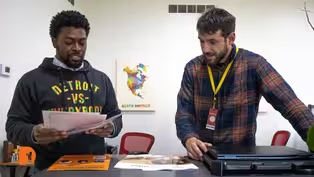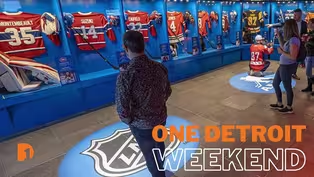
‘Marqueetown’ explores history of independent movie theaters
Clip: Season 9 Episode 15 | 8m 24sVideo has Closed Captions
“Marqueetown” follows a film lover’s quest to save a historic Michigan movie theater.
A new documentary “Marqueetown” follows film lover Bernie Rosendahl’s years-long quest to save and restore The Nordic, a historic movie theater in Marquette. One Detroit’s Chris Jordan spoke with the co-writers and directors Joseph Beyer and Jordan Anderson about the film, the history of independent movie theaters, and their cultural importance as gathering spaces.
Problems playing video? | Closed Captioning Feedback
Problems playing video? | Closed Captioning Feedback
One Detroit is a local public television program presented by Detroit PBS

‘Marqueetown’ explores history of independent movie theaters
Clip: Season 9 Episode 15 | 8m 24sVideo has Closed Captions
A new documentary “Marqueetown” follows film lover Bernie Rosendahl’s years-long quest to save and restore The Nordic, a historic movie theater in Marquette. One Detroit’s Chris Jordan spoke with the co-writers and directors Joseph Beyer and Jordan Anderson about the film, the history of independent movie theaters, and their cultural importance as gathering spaces.
Problems playing video? | Closed Captioning Feedback
How to Watch One Detroit
One Detroit is available to stream on pbs.org and the free PBS App, available on iPhone, Apple TV, Android TV, Android smartphones, Amazon Fire TV, Amazon Fire Tablet, Roku, Samsung Smart TV, and Vizio.
Providing Support for PBS.org
Learn Moreabout PBS online sponsorship(soft music) - You guys are the writer/directors of the new documentary "Marquee Town".
Tell us a bit about what the film is, the premise and kind of how you came to this project.
- The story came to us after I discovered Bernie Rosenthal's project to save a historic art house theater in Marquette.
And I found out that it had been the theater of his youth, you know, the place that he saw movies growing up.
And I just thought it was kind of a fascinating story, I think because it was sort of a David and Goliath challenge, you know, to find the money to restore this historic theater and then to run it as a nonprofit.
And I started telling Jordan about what I had discovered and we were both very interested in it and Jordan suggested that maybe we could do a short film because it was so visual.
And that short film turned into a two year project with a feature documentary our first time ever taking this on.
It is a story about a guy who tries to save a historic movie theater.
In the background, we hope it's also a story about 100 years of movie history because the narrative of the Nordic Theater is very much like the narrative of so many other single screen art house theaters, especially in Michigan.
- Lots in there kind of looking at the current state of movie theaters and sort of balancing like the love that we feel for these theaters and just the state of that business, especially in, you know, the post 2020 world here.
- Yeah, the bad news of course is how many historic places of all types are on the edge of, you know, being lost.
And during the course of making this film the Maple Theater, where we shot our only interview with Bernie Rosenthal, that was his new hometown theater, a neighborhood theater he adored.
And right as we were finishing the film, it was announced that that was closing.
- If you zoom on a little bit from a film we made about love of theaters, it's a film about what we've lost in these last few years.
And even what was leading to it is this sense of community, this sense of coming together, of not just feeling so isolated.
And so you find these things representing so much more than just the sum of their parts.
- I think what was kind of amazing then was when we took "Marquee Town" on the road, we did an independent film tour where we wanted to give back a little bit.
So we donated a hundred percent of the profits to the venues that we visited.
We did over 30 cities and along the way we have found thriving nonprofit community-based theaters that have kind of reinvented the model and created a sustainability and a kind of community around gathering for, you know, live theater, for movies, for music.
There were a lot of moments where we felt very optimistic, don't you think?
- Absolutely, I think I've never been more bullish on the viability of these spaces as you know, community gathering places and something that's bigger than just the movies that they're showing.
- Going back into the documentary, it starts with Bernie, but it really spins off from there into this whole history of independent theaters in Michigan in the early 20th century and how this whole ecosystem came to exist.
How did you guys as documentarians approach that history and digging into it?
- It was a rabbit hole that Bernie starts by launching his own project and we became fascinated with the Nordic Theater and then as we researched it, all of the characters involved, Delft Theaters incorporated, the company that built this technological wonder and was based in the UP they became a network all across the state and we learned so much about them and then came home and realized that the heart of our story was really Bernie's quest.
And so then we filtered all of the actual history through his eyes.
And so that's how we started blending cinema history with Bernie's story.
And then our breakthrough moment at a point of a lot of frustration because we had so many hours of interviews and so much to try and sift through.
But Jordan said we could use the language of cinema to tell a story about cinema.
And suddenly our documentary became a real movie because it wasn't an academic talking heads piece.
We infused a ton of comedy, we hope and creativity that helped you through this story, but do it in hopefully an unexpected way.
And if it lives on as a time capsule of a little bit of Michigan history, that would make us just so happy.
And if it inspires other people that are trying to do what Bernie did or facing challenges saving another place that would be even better.
- [Narrator] Detroit PBS will have an encore broadcast of "Marquee Town" on October 20th at 12:00 PM and next week on "One Detroit", we'll look at the plight of independent theaters closer to home.
Producers Bill Kubota and Chris Jordan will have a report on how some movie theaters in metro Detroit have managed to stay open while so many others have closed their doors.
Royal Oaks main art theater torn down two years ago.
In West Bloomfield, the Maple Theater closed and leveled this year.
In Macomb County, the Idle Roseville Theater, owned by the city awaits redevelopment.
While in St. Clair Shores business district, what was once the Shores Madrid Theater could become a restaurant and performance venue next year, changing viewing habits and the pandemic have taken their toll.
Despite that the Milford Independent cinema in West Oakland County is still open.
Its operator gave up the business in 2020, but a nonprofit was created to keep it going with first run movies and more.
- Let's get this game going, sound good?
- [Narrator] It's Monday night.
The crowd's here for a round of movie trivia.
- Remember please, no phones, no phones.
This is not what you can look up.
It is what you know.
Part of our mission is to bring film and film knowledge to the community.
We have some fun, we play for a couple hours, we sell some popcorn and that helps to keep our doors open as well and everybody has a good time.
- [Narrator] How do other movie houses stay relevant in the digital age?
- The fight always seems to be like, how do you get people to come into a theater instead of staying at home and watching Netflix?
- That's been a challenge.
You know, about what to show.
And certainly our content has changed quite a bit in the last 20 years as our audiences kind of aged out.
- [Narrator] The Redford Theater in Northwest Detroit opened in 1928, still here, thanks to a nonprofit that took it over in the 1970s.
On the city's east side, the nonprofit friends of the Alger Theater has worked to save their movie house for decades.
Their marquee serving as the community billboard - We put on our marquee messages weekly, right?
And we make enough money from that to pay our water bill and our electric bill.
- [Narrator] The Alger formerly projected its last feature film 40 years ago.
There's the proof up in the projection booth.
- "Friday the 13th", part five in 1985.
It's right there.
- [Interviewer] They didn't come back to get the reel, huh?
- Apparently not.
- [Narrator] Next week "One Detroit"'s Chris Jordan shows us around the long idle Alger, the still hopping Redford, and we'll meet historic Howell theater owner, Tyler Depero, and find out how he manages to keep his doors open.
- They're slotted on the side like that 'cause some people think...
BridgeDetroit hosts free Refugee and Immigrant Resource fair
Video has Closed Captions
Clip: S9 Ep15 | 4m 16s | BridgeDetroit hosts a free Refugee and Immigrant Resource Fair in Southwest Detroit. (4m 16s)
OPINION | Contributors discuss Michigan’s U.S. Senate race
Video has Closed Captions
Clip: S9 Ep15 | 7m 9s | Zoe Clark, Stephen Henderson and Nolan Finley discuss Michigan’s tight U.S. Senate race. (7m 9s)
Things to do in Detroit this weekend: October 11, 2024
Video has Closed Captions
Clip: S9 Ep15 | 2m 46s | Check out a spooky night out, a food festival, hockey history and more this weekend. (2m 46s)
Providing Support for PBS.org
Learn Moreabout PBS online sponsorship
- News and Public Affairs

Top journalists deliver compelling original analysis of the hour's headlines.

- News and Public Affairs

FRONTLINE is investigative journalism that questions, explains and changes our world.












Support for PBS provided by:
One Detroit is a local public television program presented by Detroit PBS


